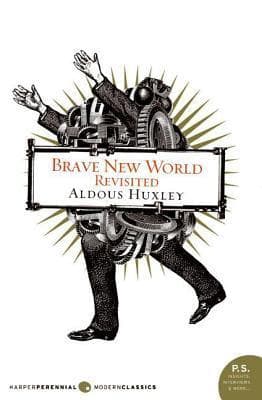
Book Review Summary: Brave New World Revisited
Introduction
"Brave New World Revisited" by Aldous Huxley is a nonfiction exploration of the themes presented in his groundbreaking novel, "Brave New World." Published in 1958, this book serves as a trenchant plea for humankind to educate itself for freedom before it is too late. Huxley scrutinizes threats to humanity, such as overpopulation, propaganda, and chemical persuasion, and explains why we have found it virtually impossible to avoid them. In this article, we will delve into the views and opinions of readers who have experienced both "Brave New World" and "Brave New World Revisited."
About Aldous Huxley
Aldous Huxley, born Leonard Huxley, was a prominent British writer known for his novels and wide-ranging output of essays. He spent the latter part of his life in Los Angeles, California, where he wrote some of his most significant works. Huxley was widely recognized as one of the pre-eminent intellectuals of his time, examining social mores, norms, and ideals through his novels and essays. He was also interested in spiritual subjects such as parapsychology and philosophical mysticism.
Analysis of Views
- Predictive Power: Many readers praise Huxley's ability to predict future trends and phenomena. They find his predictions about overpopulation, propaganda, and chemical persuasion to be particularly insightful and relevant to the modern world.
- Comparative Analysis: Some readers compare Huxley's work with that of George Orwell's "1984" and find similarities in their themes and predictions. They discuss the similarities and differences between the two authors' styles and perspectives.
- Social Commentary: Readers appreciate Huxley's critical analysis of social institutions and the ways in which they contribute to the erosion of independent thought and freedom. They find his observations on topics such as propaganda, indoctrination, and the manipulation of masses to be thought-provoking.
- Relevance to Current Issues: Many readers find Huxley's insights into overpopulation, propaganda, and the manipulation of societies to be applicable to contemporary issues. They appreciate the relevance of his work to current political climates and the importance of recognizing these threats to humanity.
- Critique of Huxley's Work: A few readers express disappointment with Huxley's work, particularly in comparison to Orwell's "1984." They find Huxley's writing style to be caricatured and unengaging, and they feel that he overemphasizes the similarities between his own work and Orwell's.
Reasons for Recommendation
- Predictive Power: Readers recommend "Brave New World Revisited" for its ability to predict future trends and phenomena, making it a valuable resource for understanding the challenges facing humanity today.
- Social Commentary: The book's critical analysis of social institutions and the erosion of freedom resonates with readers, making it a thought-provoking exploration of contemporary issues.
- Relevance to Current Issues: The relevance of Huxley's work to current political climates and the importance of recognizing threats to humanity are compelling reasons for recommending this book.
Reasons for Not Recommendation
- Overemphasis on Similarities: Some readers recommend against "Brave New World Revisited" due to Huxley's tendency to overemphasize similarities between his own work and Orwell's "1984." They find this comparison detracts from the unique qualities of Huxley's writing.
- Lack of Engagement: A few readers express disappointment with Huxley's writing style, finding it caricatured and unengaging compared to other works they have read. This lack of engagement may deter some readers from fully appreciating the book's insights.
Conclusion
"Brave New World Revisited" by Aldous Huxley offers a thought-provoking exploration of the themes presented in his groundbreaking novel "Brave New World." Through his critical analysis of social institutions and the erosion of freedom, Huxley provides valuable insights into contemporary issues facing humanity. While some readers appreciate the predictive power and relevance of his work, others find it lacking in engagement and overemphasizing similarities with other authors. Ultimately, whether one recommends this book depends on their personal preferences and their interest in exploring the themes of dystopia, freedom, and the challenges facing society today.